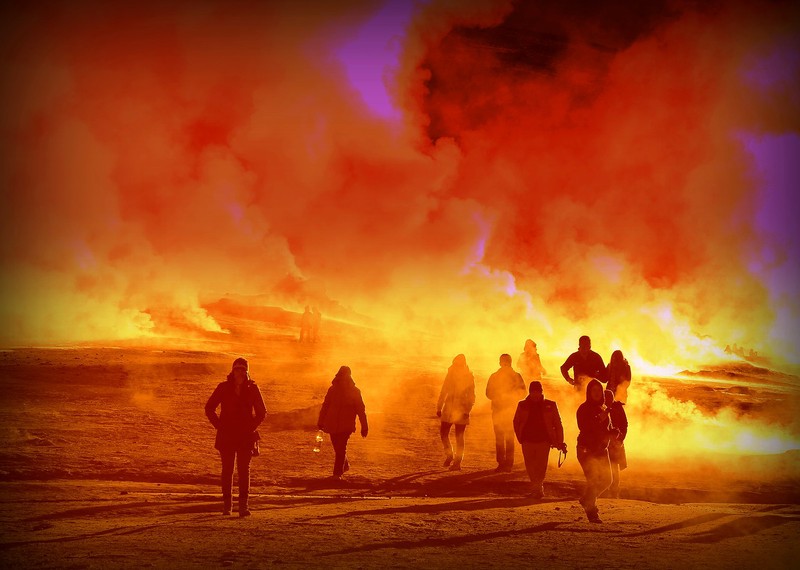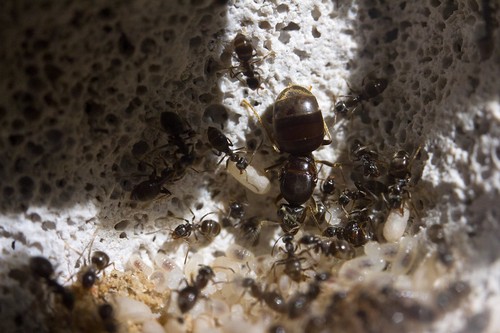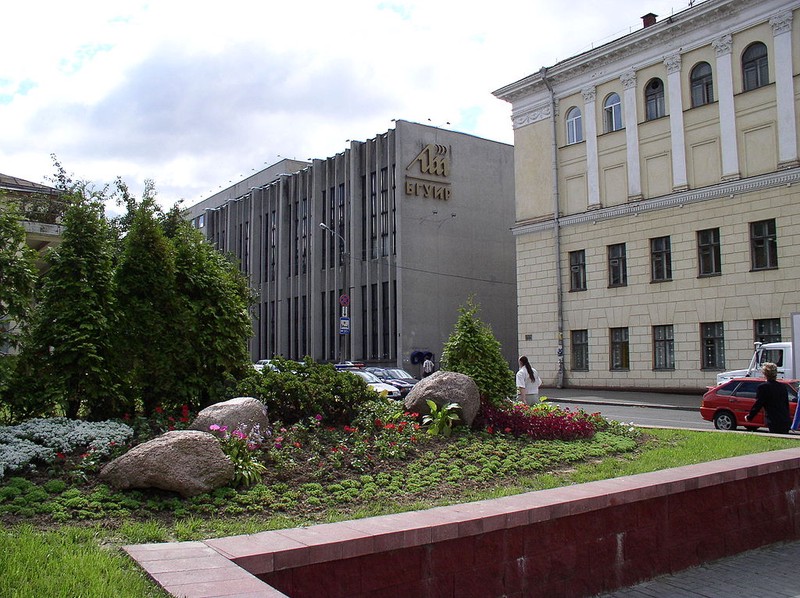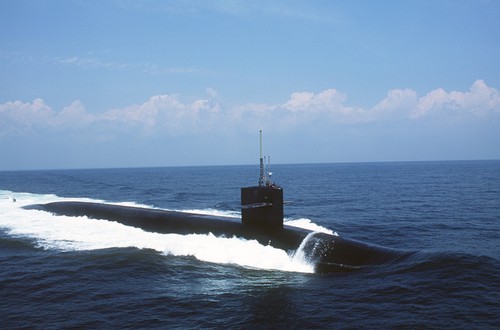Survivors!

After the initial blast from the sun on the first day of the harvest a passenger jet with sixty 3 people on board managed to miss the Andes Mountains and crash land in a remote area of the Atacama Desert. The ten survivors of the crash stayed with the plane during the three days of darkness and another two days after. But when they had neither seen nor heard any search aircraft and the food on the plane had been exhausted and they only had a couple of days worth of water remaining, they began hiking West through the desert toward the coast to look for help. By the time they arrived at a coastal village, the ants had already left the desolate area because the available food sources had already been hauled away and this region was too dry for the ants to survive there for long. This group of survivors had no idea what had happened to the world, and the small village was abandoned. It was obvious that there had been some sort of struggle for survival here as homes, automobiles, and other structures were damaged, most of them beyond easy repair.
There were some indications of what had happened remaining, but the group could not discern what the clues meant. They found bloodstains in a bus sitting on the side of the main road, but there were no bodies. Many of the windows were broken and one side of the bus had been ripped open as if by a large prying tool, something that would be too big for a person to use, perhaps an industrial machine of some type. The ants had carried away any of their own dead, but an ant leg with bullet holes in it was found next to what had served as a police station, someone also found an ant antenna draped across a roof. But though everyone looked the objects over and they appeared to be from some kind of creature, they could not be sure of what they were looking at or what it meant.

After the third day of darkness was over and the sun began to give its light again, the food supply coming into the nests and the great queens began to slow. The internal egg-producing processes inside the larger phases of queens began to slow down also and would eventually stop. The build-up to the great ant armies of the harvest had taken months and each queen had produced millions of eggs, and now in just a few days, the harvest was already ending. The larger ants that had taken the lead of the army during the harvest were already running out of food for themselves and were weakening. The ants had effectively cleansed the earth of millions of animal bodies that would not have survived the disastrous blasts of energy from the sun, the earthquakes, the tsunami waves, and the weather extremes that occurred during the harvest anyway. They cleared the land of plants that would have dried up and created enormous wildfires or would have been saturated with seawater and have died and rotted in place. The ants had in fact performed a great service, and as their work was almost finished the survivors in some places could begin to emerge and the earth's foliage could begin to return, bloom, and bear fruit once again.
Many of both people and animals that fled into swampy regions of the earth ahead of the ants survived the initial onslaught, aided in no small part by the alligators or crocodiles that made the swamps their homes. It turns out that these great reptilians are immune to ant stings, and in their water habitat they were able to easily overcome even the largest ant intruders, rolling them under the water and snapping their limbs like twigs. Sometimes herds of deer walked right past furious battles between ants and these large beasts without being molested by either side. But the swamps invited another danger, the giant tsunamis came far inland and inundated most of these low-lying areas killing the majority of those that had sought refuge there. But there are always survivors, the floods came and receded and then came again and again. But some of the refuge-seeking creatures always found a way to survive, the swaps had become an especially a good refuge for the birds of the world as they could always find someplace dry to rest until the floodwaters receded. The wildlife that normally made the swamps their home, like the gators and the crocs, was largely only inconvenienced by the floods.
Other animals and people escaped into the frozen regions of the earth to escape the ants. But these too found survival was not just about getting away from the ants, they also had to survive the extremely cold temperatures and raging storms, and of course, they did not get away from the earthquakes, volcanoes, and other natural disasters that were also taking place in these regions of cold climates just as they were in other regions of the world. Food was also a huge problem for those that had escaped to colder climates, there were no truces between species here at all, it was simply a dog-eat dog survival of the fittest situation, and both the small and great fought over shelter and available resources. Often, whoever lost the fight became the resource that then had to be defended.

A Nigerian man who made his living by created works of art out of discarded plastic bottles and selling them to tourists survived the harvest and saved many in his Country. When the attack started, the artist known as bottle man around the village looked outside to see an elder battling a large ant, a woman and some younger men showed up with kitchen knives, sticks, and rocks to try to drive the ant away but were being overpowered. In the end, a man with a machete lopped the ants head off to end the fight, but what they didn't know at the time was that this was just a scout ant, the worst was yet to come.
Bottle man turned to look around among his belongings for something that would serve as a weapon, but all that he had was the small knives and scissors that he used to create his art. Thinking fast he started cutting his large pile of empty bottles into strips and forming them around his legs, body, and arms. After thinking about it for a moment he also added a section around his neck leaving plenty of room to move his head around in every direction. Looking outside again he could see the dead ant's body lying in the street, there were lots of people also but they were all preoccupied watching herds of animals stampeding past the outskirts of the town. Moving over to the lifeless ant, bottle man scooped up some of the sticky residue oozing out of the wound where the ant's head should have been and he began rubbing it over the sections of plastic bottles on his arms and legs. Next, he started looking around for the head, which he found where it had been left in the weeds after some of the older kids had used it as a makeshift football. Bottle man picked up the head and went back to his home to find some cordage. There he tied the head around his shoulders so that it sat on him like a small backpack, the antenna would flop over his head and shoulders whenever he stooped over making him look almost like any other ant.
As bottle man came back outside to show everyone what he had done the first wave of soldier ants arrived. People scattered in every direction as panic instantly took hold, and in their haste to escape the oncoming ants the villagers had left a small child sitting in the middle of the street crying. Bottle man ran to her and covered her with his body, miraculously the entire ant army swept past them without even stopping. But there were ants everywhere ransacking the village. Bottle man calmed the child down with soothing words as he held a finger up to his lips for her to be quiet. When he saw that she understood he lifted the little girl and carried her to his place. He then immediately started fitting strips of bottles around her small body. It was fast work and in no time they were outside again beside the dead ant's body smearing the sticky ant juice all over the girl. There was not another ant head available and if there had been it would have been too big for her small frame, so this would just have to be enough. Bottle man had also picked up a small plastic bucket with a lid and wire handle which he now filled with the last of the oozing ant juice. The two began to travel looking for other survivors, along the way they were passed several times by ants, some even came over in front of bottle man and felt the dead ant's antennas. Each time the girl would get under bottle man and he would stoop over so that the antennas flopped over his shoulders, and after a brief inspection, the ants always moved on without hurting them.
When it was all over there were very few remaining among the living in what had once been the Country of Nigeria, but all of those who did survive owed their lives to bottle man and the child who gave her name as Mira. Every time they found someone alive bottle man showed them how to avoid being eaten by ants. Once the harvest had ended those who survived began to rebuild their lives, even though they had all suffered great losses now they still had reason to rejoice for now they were at least free from oppression, the kind of free like they had never known before. The daily hustle was over, the corruption had ended, love abounded in this new world and the very humble person once known as bottle man was now known as "Egharevba" and he preached a message of peace and cooperation that would resonate throughout that region for generations to come.

The Governments and thought leaders from all over the world had almost completely failed in their attempt to save civilization, in some cases, like the huge stores of underground food supplies, they had actually aided the ant armies in the great harvest. In spite of this poor showing from those who thought themselves to be smarter than the average person, it was in fact mostly those very same average people and those people that might be called lucky or blessed that ended up surviving the harvest while the brain trust of the world mostly perished. The exception to this was found in a collection of students a Belarus State University. These students had all attended classes held by the late Professor Ivan Savitskaya, an amateur geologist whose hobby was hunting for fossils and unusual rock formations. Professor Savitskaya was teaching modern computer technology at the University, but each year he ended his class with a field trip for those who volunteered to travel with him to an area riddled with caves and see something that he had discovered during one of his personal expeditions.
Inside a small cave, the professor showed these students a fossil of a large ant surrounded by unhatched eggs, which were also very large for an ant. He then went on to tell the students that the fossil only dated back a few thousand years, he proved this by showing an item that was hidden from all but the professor's trained eyes. Imbedded just under the ant's body was a petrified human bone, rubbing a small section at one end of the barely identifiable bone the Professor revealed to them a small rounded section of what appeared to be gold. It was a small part of maybe a gold wrist bracelet that had been worn by the owner of that petrified arm, the rest of the bracelet being completely embedded in the rock of the cave wall. By showing this to you he said, I'm trusting each of you to leave this important find as it is and not reveal this discovery to those who might come seeking treasure. This place, he said, is probably a remnant of what is known as the great flood. I believe, he continued, that the world was not only dealing with a flood but also by an invasion of these ants and that this one got trapped by a big wave and covered in mud and debris. Large ants have been discovered in other regions among fossils in places where they should not have been, and those researchers have simply overlooked or completely downplayed this fact. This is just a small part of the available evidence that leads me to believe that there was a great cataclysm at some point in the past only a few thousand years ago, said the Professor. The DNA records even show that there was a big bottleneck in human population growth a few thousand years ago, this matches my own personal theory that these disasters are cyclical and that one day soon we may have to face something like this again.
Professor Savitskaya went on to explain that if he was correct then such disasters are accompanied by an invasion of ants, whether terrestrial or extraterrestrial ants he could not tell for sure, but his guess was that they were a special breed of ants from this world, perhaps living deep within the earth even now. All of my life I have tried to be prepared for a major disaster said the professor, I'm showing you this now because I'm not getting any younger and I want someone else to know these things and be ready for that day if it does come.

Taking Professor Savitskaya's advice to heart, his students over time had formed a club that met once a year to discuss preparation for a disaster and a potential war against an ant invasion. And though the Professor himself had passed away almost a decade ago, his former students were still preparing for what later would become known as the great harvest.
When the power went off and the sun went dark, each member of the apocalypse club immediately went to work. First, they grabbed all of their family and friends that were close at hand, then they went straight to the University with the emergency supplies that had been pre-staged in trailers, trucks, and cargo vans for the potential arrival of this day. They had all studied ant behavior and they had all broken down ways to defend against ant attack through extensive experimentation in the field. They had battery-powered sound generators that they kept inside faraday cages along with both short and medium-range radios for communication. They had barrels of every known ant poison or deterrent available so that they could build a perimeter around the university. They also had enough food and water stored up to last for at least three months, hopefully, the disaster would not last that long. After much experimentation, they had discovered the sound frequency that ants used to communicate with each other, so special loudspeakers were attached to the roofs of all the campus buildings and connected to the battery-powered sound generators. They hoped to keep any ants driven far away from that entire area using these nonlethal sound-producing devices, but if any ants did come closer the next line of defense was the poisons, and after that, there were rings of diatomaceous earth surrounding the buildings. If the diatomaceous earth failed then the next line of defense was noxious smoke-producing candles. If all else failed the final defensive measure was provided by homemade flame throwers, but everyone prayed that these would not be needed because of the danger of setting the entire campus on fire.

Out of all the military ships and submarines at sea when the day of harvest began, only the USS Pennsylvania (SSBN 735) survived the catastrophic changes happening above them to both the landmasses and the oceans. Nothing was in its place, there was no good way to navigate in a world that had completely rearranged itself in only a matter of days. The depth of the ocean had been vastly reduced and there was dry land now that only days ago had been deep underwater. The Captain did not yet understand that the land he was now viewing through his periscope had also undergone massive changes. Entire mountain ranges had simply disappeared. The land was much flatter now, the oceans smaller and not nearly as deep. There were no ports to return to, no radio traffic with orders from command centers, those institutions no longer existed and those who had manned the military bases had become food for a different type of military force, one that had not been planned for. This lone surviving nuclear-powered submarine finally surfaced after several days underwater with no contact with the outside world, no sounds of shipping anywhere, and having been pummeled by venting underwater volcanoes, huge waves, and the continuous roar a grinding that accompany large movements of landmasses. Once surfaced began to search the coastlines for signs of life, but they saw only an occasional bird. Since nothing was familiar they could not fix their location, when it became apparent that none of the coastlines they were viewing existed on their charts, they started creating new maps of the coastlines they encountered as they went. The radio room broadcast over various radio frequencies but never received any answers. Even with all of the sophisticated eavesdropping equipment onboard scanning for any human electronic activity, the massive communications systems that had come to take for granted seemed to have simply vanished.
After six months at sea and after running aground twice in these uncharted waters, a signal was finally received from a land-based unit estimated to be about one hundred and fifty miles north of their current location. The voice on the radio spoke Russian, they discovered that it was emanating from a building in what was formerly Belarus. All indications were that these were the last people on earth, that was not really true, but these were the last people on earth that retained the possibility to contact a Submarine by radio and they were the last people still living in a modern city. There were one hundred and thirty-five men and two women on the Pennsylvania, after a few days and a lot of assurances of peaceful intent, they were greeted by a contingent from the two thousand three hundred and eighty-two students, staff, and citizens of Belarus that had survived the harvest and had just made the arduous journey to the coast to hold a meeting with the Captain and crew.
The saved libraries and most of the buildings and infrastructure of the University, coupled with the power generated by the Pennsylvania's nuclear plant, once power connections could be established, were more than enough to begin rebuilding civilization. The nuclear power plant would last for at least twenty years, by then, new power generation plants hopefully could be built, this would then become the beginning of the New World. This new world would form a language of its own which would blend Russian and English into a new tongue. The original area around the University would remain Belarus, but after much discussion it was agreed that their new world would be called Pennsylvania.
Only two weeks after the sun began to shine its light again on the new world, the last of the bigger ants died away and would not return again until the next harvest. For a while, ants would become the most hated creatures on earth and were trampled down by animals and birds alike. Nests were destroyed wherever found, but of course, the ant is very resilient and they continued their tiny little lives knowing that their day would come again and they could wait. Over time the beasts of the earth began to forget about the ants, and they again started to ignore them and their constant activity.
This concludes the 7 part story of The Great Harvest, if you enjoyed this story and would like for me to continue writing such adventures please let me know in the comments below.
Part 2: The knowledge of the desolate
Part 3: The Beginning of the End
Comments